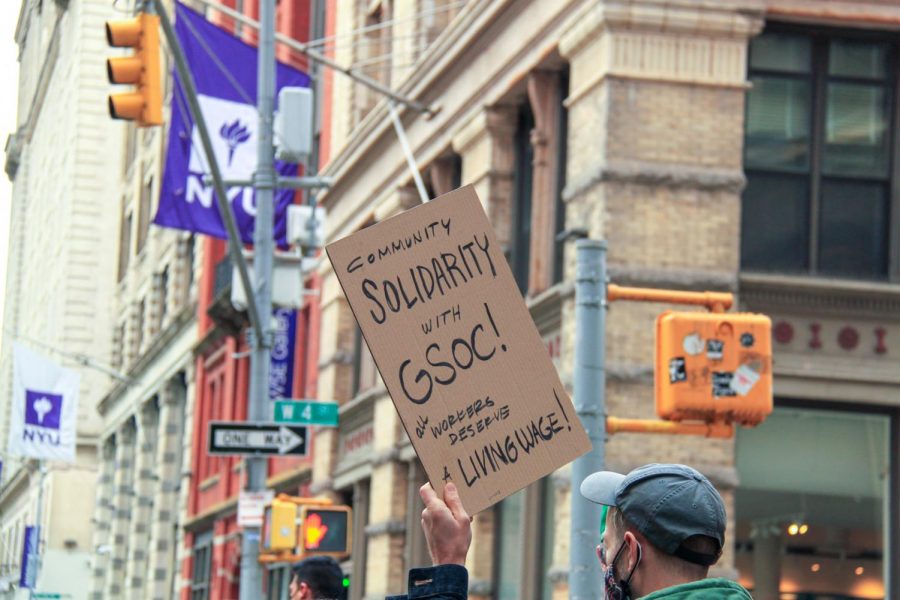Editorial: Support graduate student union strikes
From the Ivy League to the West Coast, graduate student workers are going on strike because of low pay and meager benefits. Graduate union strikes deserve our solidarity as they pave the way for labor struggles nationwide.
Earlier this year, the NYU Graduate Student Organization Committee secured a pay and benefits increase from the university after three weeks of protesting unfair compensation. Students from other universities who are going on strike deserve our solidarity in their fight for fair pay. (Staff Photo by Alexandra Chan)
November 8, 2021
Earlier this year, NYU’s graduate student strike shocked the nation. After three weeks of more than 2,200 grad student union members joining together to protest unfair compensation, the Graduate Student Organizing Committee secured a historic pay and benefits increase from the university.
From a minimum wage increase for graduate students to new sanctuary protections for all students against government agencies like U.S. Immigrations and Customs Enforcement and Customs and Border Protection, GSOC’s collective action has improved the lives of all NYU students in a significant way. The precedent set by GSOC has also bolstered other graduate worker unions in their own fights. Across the country, graduate students are going on strike to demonstrate that their employment conditions and inherent dignity matter more than extravagant paychecks and ritzy penthouses for university leadership. More workers should join them.
On Nov. 3, the Columbia University student worker’s union announced that they were going on indefinite strike in order to call for a living wage, improved health insurance packages and third-party arbitration to negotiate a settlement. With around 3,000 union members, this is among the largest strikes occurring in the United States just a few miles north of our campus.
According to the Student Workers of Columbia, the university pays graduate student workers $6,000-$19,000 below a New York City living wage. The union also cited Columbia’s decision to change compensation structures in the middle of the summer with very short notice, resulting in an $8,000 loss for graduate workers. Eight thousand dollars might not be a lot for Columbia president Lee Bollinger, who earned $4.6 million in 2013, but it’s a significant amount of money for the graduate students at his university who actually have to work for a living. Graduate workers often must sign up for SNAP benefits or take a second job on top of their existing duties to put food on the table. By paying them meager and unreliable wages, Columbia isn’t treating their graduate student workers with the respect that they deserve.
Last month, Harvard’s graduate students went on a three-day strike to protest the university leadership’s refusal to increase student pay or make changes to its harassment grievance policy. The Harvard Graduate Students Union is also seeking improvements to mental health and specialist care in their benefits package, a vital demand given the ongoing global pandemic. While this strike was meant to signal that the HGSU is steadfast in their resolve, the university’s graduate students should be prepared to extend their strike indefinitely.
University of California system graduate student workers are also preparing to strike. 6,000 lecturers organized with UC-AFT are striking as a result of increased workloads and reduced opportunities for tenure. The median income on UC campuses for non-tenured lecturers is only $19,000, while tenure-track professors can receive six-figure salaries. The UC system refused to recognize the student researchers union in September despite the authorization of more than 10,000 workers. UC-AFT’s next bargaining session is on Nov. 10, and the SRU-UAW union of UC student researchers will hold a strike authorization vote from Nov. 10 to Nov. 19. It’s a disgrace that graduate students are getting their paychecks fleeced across the country. As UC graduate students prepare to fight for their rights, thousands across the nation stand in solidarity with them.
Undergraduate students should support graduate student worker unions. About 10% of the NYU undergraduate population signed a solidarity pledge in support of GSOC. HGSU’s strike occurred during the family day weekend, where first-years staged a walkout during Harvard president Lawrence Bacow’s address in solidarity with the union.
These strikes have garnered prominent national support. Sen. Bernie Sanders (I-Vt.) called in to the NYU GSOC picket line. Rep. Alexandria Ocasio-Cortez (D-N.Y.) sent coffee and donuts to the SWC picket line. Rep. Ayanna Pressley (D-Mass.) tweeted at Harvard, questioning their attempts to intimidate the graduate student workers. AFL-CIO president Elizabeth Shuler wrote a letter calling on the UC system to recognize SRU-UAW.
Graduate student workers are not alone in their fight, and they deserve our support. Without them, universities would completely cease to function: When NYU graduate students went on strike, lesson plans, office hours and assignment grading fell to the wayside. Graduate students elsewhere, whether in uptown Manhattan, Cambridge or California, have the power to demonstrate their importance to their universities’ daily functions and fight for the treatment they’re owed.
This wave of graduate student union strikes is occurring alongside a growing understanding that if you work somewhere, you’re owed basic rights like fair compensation and dignified working conditions. As more unions consider striking, they should build on the successes of student unions like NYU’s GSOC, which was able to secure significant wins. Graduate student workers should continue to demand what they deserve. Their successes will inspire others and lead to concrete, positive change across America’s universities.
A version of this article appeared in the Nov. 8, 2021, e-print edition. Contact the Editorial Board at [email protected].



























































































































































